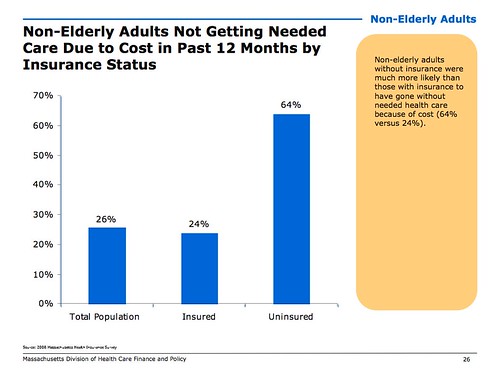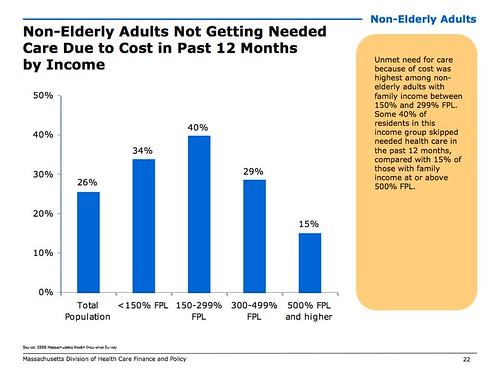One of the claims that has been going around is that healthcare in Massachusetts is affordable; in fact, MIT economist Paul Jonathan Gruber, who has come under fire for conflicts-of-interest, has made this claim:
In considering affordability for a group, we need to establish a sensible benchmark whereby insurance is considered affordable if "most of" a group can afford it. We can disagree about what "most of" means, but it would be wrong to define "most of" only as "very close to 100%."
Well, that's good to know. Because most humans, as opposed to MIT economists, would think, when it comes to your health, that, let's say, one out of five adults not being afford health care isn't all that, erm affordable. So let's see what "most of" actually looks like (these are 2008 data from MA):

And 'affordable' also means that one in six people have a hard time paying the bills:

Now, let's look at who is the beneficiary of all of this affordability:

And:

For those wondering what "150-299% FPL" means, for a family of four, that's between $31,812 - $63,612 per year. That's right, households that are in the second fifth take it in the chops (MA has a high median household income). Even if you're around the median (~$89,000), there's still a good chance that your healthcare really isn't affordable.
If this is the standard that is being used for the current healthcare reform legislation, this is both a policy and political disaster in the making. Atrios always points out, people have to like this shit. As I noted two years ago, forcing people to purchase healthcare plans which do not provide them the healthcare they need (which is what the above figures indicate) is not popular--nor should it be (does that even need to be written?).
Sadly, it looks like the Senate bill (and that's what will pass) is very similar to the MA bill. This is a program that will rightly be perceived as helping the poor at the expense of the lower-middle and middle class (the upper-middle and upper class can take care of themselves). It plays directly into the hands of Republicans, and it does so because Democrats were too concerned with the shibboleth of cost reduction* to pass a plan that would be broadly popular.
This is not affordable, at least as the term is used by decent human beings.
*I would argue the primary healthcare goal over the next five to ten years should be to ensure that everyone gets the healthcare they need, regardless of income, not deficit reduction. Of course, the more universal proposals actually would reduce costs more than the Senate monstrosity. Even if that weren't the case, deficit reduction should not be the first priority, given the suffering and death a crappy healthcare system causes.

Democratic politics, like all politics, is characterized by the pork barrel. Acting like a deficit hawk is just a mask for the fact that you don't support spending that actually helps people rather than lines the pockets of military contractors.
Face it, progressives don't have any leverage over the Democratic Party. They've made it perfectly clear that they're not gonna break some shit to get their way. They still act like the worst thing anybody ever did was vote for Nader.
Just slightly off-topic:
http://www.fivethirtyeight.com/2010/01/healthcare-spending-and-life-exp…
What percentage of the median income should reasonably be devoted to health care? For example, on another sci blog, the author is giddy over the prospect that the percent of the median income devoted to food may rise from the current 7% to around 30% as she thinks this will make for a more local food production system.
But in talking about things that are affordable or not affordable, what percent are people devoting to certain spending categories. Without knowing that, it is hard to know whether or not something is trulya ffordable.
Thanks for this analysis - I think it is very good and useful.
Apologies for the digression from your basic topic.
Mike, I'm not "giddy" about the rise in food prices - in fact, I think it is going to be a very, very painful process. I think it is *inevitable* given the resources we invest in our food systems, however. Cheap food is a product of cheap oil and other energies and they aren't a long term reality.
What's fascinating to me is that cheap food is already unaffordable - in the US we subsidize food heavily at several levels - for example, we're hovering on the border of 1 in 8 people requiring food stamps. Food subsidies at that level are no longer simply a safety net program, the represent an observation that the cheapest food in history is unaffordable to a substantial population - in large part because of housing and energy costs. Affordability in this case is likely to undergo long term shifts by simple necessity.
Sharon
And now it looks like Massachusetts is about to elect a senator who has, to all intents and purposes, committed to making the situation worse.